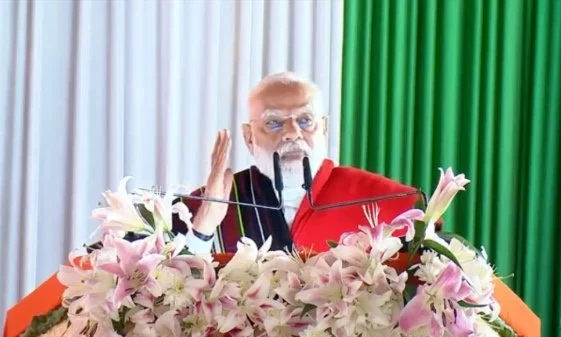Justice Denied in Manipur, Modi Brings Development Instead
Prime Minister Visits State for the First Time Since Violence But Skips Accountability
September 13, 2025
Screenshot from YouTube
Prime Minister Narendra Modi’s visit to Manipur on September 13, more than 28 months after the outbreak of violence, offered development schemes worth over 73 billion rupees (7,300 crore). What he did not offer was the one thing most needed in the state. Justice. This reveals the Centre’s unwillingness to confront the failures of governance that enabled the violence in the first place.
The Prime Minister was in Churachandpur district to lay the foundation stone for various infrastructure projects, according to Financial Express. These included the Manipur Urban Roads, drainage and asset management initiative, five National Highway projects, the Manipur Infotech Development (MIND) project, and Working Women Hostels at nine locations. But this show of economic intent glosses over the unresolved trauma of a conflict that displaced tens of thousands, razed thousands of homes, and left at least 258 people dead.
The state is still struggling to come to terms with the damage. The violence was not spontaneous. It was allowed to spread with alarming impunity. Evidence continues to surface suggesting bias and complicity on the part of the previous government led by Biren Singh and security apparatus. Yet the political message being sent now is one of economic recovery without moral reckoning.
Justice cannot be replaced by roads and hostels. The violence in Manipur was not a clash between two aggrieved groups, but the targeting of the Kuki-Zo minority by extremist groups from the majority Meitei community, allegedly backed by the state government. Ignoring the killings and rape that took place sends a message to future perpetrators that organised violence with political support can be excused or even rewarded.
Compounding the crisis is the state’s apparent leniency toward groups like Arambai Tenggol, an armed Meitei outfit accused of attacking the Kuki-Zo community. In February, the group placed conditions before the Manipur Governor on its willingness to disarm, treating the surrender of arms as a negotiation rather than an obligation. This should have raised alarm at the time, especially since the same group had allegedly assaulted elected legislators just months earlier for refusing to follow its demands. One MLA required hospitalisation, and at least two others were roughed up.
A case has also been registered with the National Investigation Agency against the group for attacking police personnel. Yet, there is no public word from the government acknowledging the group’s alleged role, let alone committing to prosecution.
Without justice, presenting the absence of violence after widespread brutality as peace is merely the staging of normalcy. Peace built on silence and forgetting is fragile. In a deeply polarised state like Manipur, where communities still live in fear and mistrust, such peace is unlikely to endure.
More troubling is the signal sent to the rest of India. If mass violence involving murder, arson and sexual assault can go unpunished in one state, why not elsewhere? If alleged perpetrators can dictate terms to constitutional authorities, why would others not try the same? The rule of law cannot be compartmentalised. Its erosion in one place affects confidence everywhere.
The Prime Minister’s visit could have been a turning point. It could have come with an apology or a call for accountability. At the very least, it could have acknowledged the pain of thousands still living with the fact that no one has been held accountable for their suffering. Instead, it offered projects and progress, asking people to move on without confronting the past.
Justice is not optional in a democracy. Infrastructure is important, but it cannot plaster over impunity. Without justice, Manipur’s wounds will fester, and no amount of concrete or fibre-optic cable will restore the social fabric torn apart by this violence.
You have just read a News Briefing by Newsreel Asia, written to cut through the noise and present a single story for the day that matters to you. Certain briefings, based on media reports, seek to keep readers informed about events across India, others offer a perspective rooted in humanitarian concerns and some provide our own exclusive reporting. We encourage you to read the News Briefing each day. Our objective is to help you become not just an informed citizen, but an engaged and responsible one.

